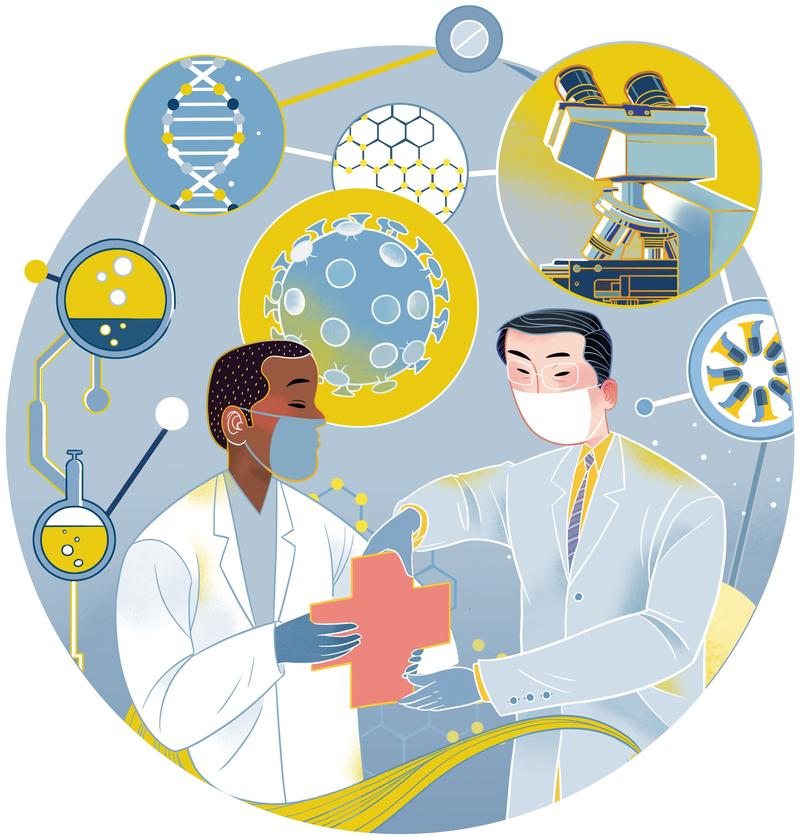COVID-19 highlights importance of public health cooperation between China and Africa
 (SONG CHEN / CHINA DAILY)
(SONG CHEN / CHINA DAILY)
The COVID-19 pandemic has exposed the shortcomings of global public health governance in Africa, highlighting the urgency of strengthening the construction of a global public health system. Most African countries have fragile and weak public health systems, and the impact of the pandemic on Africa is particularly worrying.
Throughout the outbreak, China and Africa have supported each other and worked closely together, showing their traditional friendship and solidarity, embodying the spirit of a community with a shared future for mankind.
Medical and health cooperation is an important part of China-Africa relations. The Chinese medical team for Africa has a 57-year history, and there are 973 Chinese medical staff in 45 African countries currently. After the 2014 Ebola outbreak in West Africa, China launched the largest medical and health foreign aid operation in history. COVID-19 further highlights the importance and urgency of strengthening medical and health cooperation between China and Africa, especially in public health security.
Both Ebola and COVID-19 show that viruses recognize no national boundaries. Public health security is a common challenge for all, and the international community should join hands against the pandemic. In this aspect, China and Africa have always supported each other, reinforced cooperation, demonstrated the strength of solidarity and set a model to jointly cope with major public health emergencies through unity.
Cooperation between China and Africa is conducive to improving health on both sides. For historical reasons, Africa’s medical and health systems are fragile, and their ability to deal with infectious diseases and major public health emergencies is weak. Strengthening China-Africa public health cooperation will contribute to improving Africa’s medical systems, and enhance the ability of African countries to guarantee people’s health. In this process, China’s ability to participate in international health cooperation is also strengthened, which plays a positive role in promoting domestic medical and health services.
China-Africa public health cooperation is also conducive to comprehensively developing China-Africa relations. Improving public health systems in African countries, strengthening their prevention and control capabilities, and developing their public health industries will not only improve the health and well-being of African people, but also lead China-Africa cooperation to more comprehensive, deeper and higher levels of development. Cooperation will also contribute to deepening mutual understanding, promoting people-to-people exchanges, and consolidating the foundation of long-term friendship between China and Africa.
Public health security has become a prominent global issue; ensuring it through cooperation has become vital to global governance. In this regard, Africa is in a marginal and vulnerable position. In line with the concept of “extensive consultation, joint contribution and shared benefits”, China has strengthened public health cooperation with Africa in line with promoting good, public health co-governance to benefit the world.
In view of this, China-Africa public health cooperation should be bolstered in several aspects. First: Improving Africa’s public health systems. Most African countries have not established sound, responsive and effective public health prevention and control systems, which poses a great challenge to health security in the region. In supporting African countries’ improvement of public health systems, China empowers Africa with more assistance for the prevention and control of the human immunodeficiency virus, malaria and tuberculosis, as well as in key public health fields such as maternal, child and reproductive health. Such cooperation is significant for enhancing Africa’s health security capacity and promoting medical and health services in the region.
Second: Promoting development of public health technology and infrastructure. China will vigorously support construction of the Africa Center for Disease Control and Prevention, and continue to build hospitals for African countries. In the long run, China and Africa need to actively explore ways to cooperate in the construction, management and operation of hospitals. Further, much importance should be attached to the application of technology in the provision of medical services and healthcare.
Third: Strengthening public health training. The shortage of trained personnel is one of the bottlenecks for developing medical and health services in Africa. China has trained a large number of medical and health professionals for Africa over the years, but this has yet to meet the needs of African countries. Human resource development should be strengthened, particularly in China-Africa public health cooperation. Increased training of management and medical staff as well as transfer of technology will help African countries improve public health self-reliance.
Fourth: Broadening China-Africa cooperation modalities. Assistance should be combined with investment. The development of medical and health industries in African countries should be combined with their industrialization. It is necessary to support Chinese medical and health enterprises’ investment and encourage Chinese institutions to open hospitals, produce drugs and provide medical services in Africa. Deepening cooperation will not only help Africa enhance its healthcare capacities, but also uphold China’s medical and health industries in the region.
Strengthening China-Africa public health cooperation and building new types of partnership are not only beneficial for both sides, but also safeguard and improve global health security and governance.
The author is a research fellow with China-Africa Institute, Chinese Academy of Social Sciences, and executive editor-in-chief of the Journal of China-Africa Studies. The author contributed this article to China Watch, a think tank powered by China Daily.
The views do not necessarily reflect those of China Daily.


